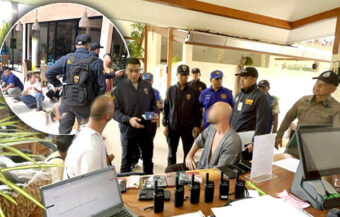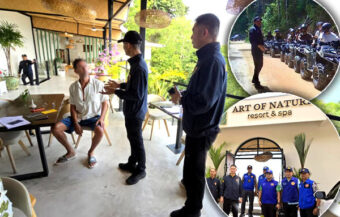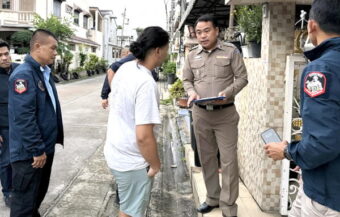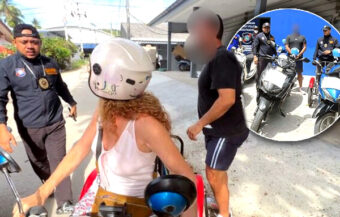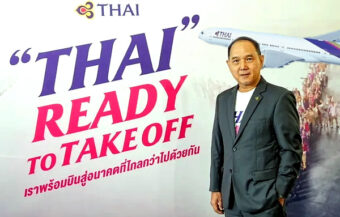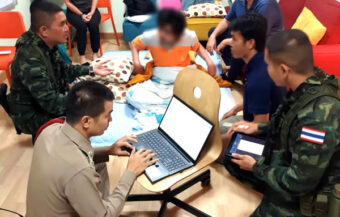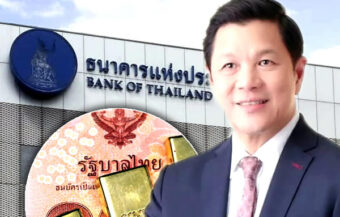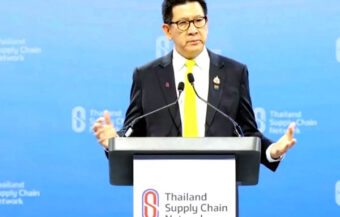Prime Minister Paetongtarn Shinawatra revives grassroots support to boost Thailand’s sluggish economy. The new initiative focuses on helping small businesses through reduced costs and increased market access. It aims to inject over ฿110 billion by January 2025.
PM Paetongtarn Shinawatra on Wednesday resurrected the old spirit of the Pheu Thai Party and the Shinawatra family’s ability to understand and grasp grassroots Thailand to help give the sluggish economy a boost. The plan, engineered by the Prime Minister’s Office and in particular with the Ministry of Commerce, will see cooperation between Thailand’s local government and large corporations to offer some respite to small and struggling entrepreneurs. Essentially, the plan builds on the government’s Digital Wallet stimulus package, which saw the first phase implemented in September. A second, larger phase is due in 2025. However, this campaign on Wednesday appears to be all about confidence and momentum.
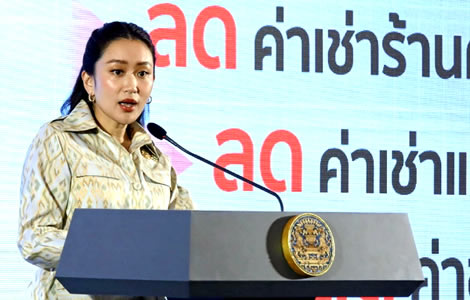
On October 16, Prime Minister Paetongtarn Shinawatra launched the “Economic Rehabilitation Project to Reduce Expenses, Increase Income, and Expand Opportunities” at Government House. The project featured live video and audio links with key provinces. It sparked enthusiasm among participants.
Wednesday’s initiative revived the spirit of Pheu Thai and the Thai Rak Thai Party. Economists may be sceptical, but enthusiasm and confidence are valuable in economic terms.
The project builds on the first phase of the Digital Wallet initiative. In September, ฿142 billion was distributed to social welfare cardholders and vulnerable people in Thailand. This campaign aims to boost small businesses and traders. It targets the grassroots economy, which is the heart of Thailand’s real economy.
Prime Minister’s personal story highlights focus on grassroots economy and small entrepreneurs
Confidence is crucial in dealing with the economy. On Wednesday, Prime Minister Paetongtarn praised Khao Suan Kwang grilled chicken, a speciality of Khon Kaen. She initiated the launch by speaking with leaders there. She recalled a delicious meal served with sticky rice. This was a treat her father used to buy for her during trips to the northeastern province.
This initiative aims to inject over ฿110 billion into Thailand’s economy. It will support small entrepreneurs and reduce the cost of living for citizens. The Ministry of Commerce is leading this effort. They are collaborating with government agencies and the private sector to drive recovery.
Muted inflation and a stronger baht are key drivers of Wednesday’s shock interest rate cut by the Bank of Thailand
Economy growing as the Central Bank and Finance see eye to eye. However the threat of political instability is also
Commerce Minister Pichai Naripthaphan, a key ally of Prime Minister Paetongtarn, was present to promote the campaign. Senior leaders from Thailand’s business community also attended. Notably, Suphachai Chearavanont, CEO of Charoen Pokphand Group, was there.
Project focuses on urgent economic revival, relief for small businesses and vulnerable citizens
The economic downturn has hit vendors and small businesses across Thailand. Despite GDP growth, many are concerned about sluggish trading conditions.
In response, the government launched this urgent project to revive the economy. Prime Minister Paetongtarn emphasised that the programme focuses on providing relief to small businesses. Small businesses make up 95% of all entrepreneurs in the country.
Since September, ฿10,000 payments have been distributed to vulnerable groups. Signs of hope have emerged from these payments. Building on this momentum, the new initiative will extend through January 2025. It includes policies to stimulate economic activity and ease financial burdens on citizens and entrepreneurs.
Three components of the initiative, to reduce costs, improve market access and lower living expenses
The initiative features three key components aimed at reducing costs for businesses, improving market access for small businesses and lowering living expenses for Thai citizens.
Reducing Costs for Small Businesses:
The government will partner with 130 large public and private organisations to reduce expenses for small entrepreneurs. This includes rent reductions for market stalls, shops, and postal fees.
Bangkok Governor Chadchart Sittipunt has committed to cutting rent for 12 markets by 50%. This will benefit around 11,000 traders. Postal fees will also be reduced for businesses affiliated with the Thai Chamber of Commerce and the National Farmers Council.
Improving Sales Opportunities for Small Entrepreneurs:
The Ministry of Commerce will provide additional sales opportunities. It will organise special events and open government spaces for businesses. Provincial halls, military camps, and other locations will serve as markets. This will increase visibility and sales potential for small entrepreneurs. Over 1,300 markets across Thailand are expected to participate in these events.
Reducing the Cost of Living:
Partnerships with manufacturers and wholesalers will offer discounts on essential goods. In essence, this will help ease the burden of rising living costs. Major retailers, gas stations, and online sales platforms will also participate in nationwide price-reduction campaigns. Consequently, more than 100,000 stores across Thailand will offer promotions and discounts as part of this initiative.
The government expects the stimulus measures to inject over ฿110 billion into the economy by the end of January 2025. This projection is based on three areas of economic activity:
Consumer Spending:
Approximately ฿78.7 billion is expected to be spent by vulnerable groups receiving the ฿10,000 payment. At length, these individuals are likely to use the money on necessities like food, clothing, and household appliances.
Business Support:
Around ฿18.7 billion will additionally be generated from activities supporting small entrepreneurs. This includes the International Live Commerce Expo, Vegetarian Festival, and other local and national events. In brief, these initiatives aim to increase business opportunities and stimulate economic activity across various sectors.
Discount Campaigns:
The remaining ฿14.4 billion is expected from price reduction fairs and sales campaigns organised by large manufacturers and retailers. In turn, these events will help lower the cost of living for consumers while boosting retail activity.
The success of the economic recovery programme depends heavily on cooperation between the government and the private sector. Indeed, cooperation was a key theme in Wednesday’s positive announcement.
Private sector involvement highlights cooperation to reduce costs and promote business growth
In effect, the Ministry of Commerce has partnered with key organisations. Both private and public sector. Certainly, these include the Federation of Thai Industries and the Thai Chamber of Commerce. In addition, Thailand’s leading manufacturers and service companies are involved. Thailand Post is a major partner, offering discounts and reducing business costs.
Commerce Minister Pichai Naripthaphan particularly emphasised the importance of this collaboration. The project is designed to benefit all sectors of society, particularly small entrepreneurs.
The Ministry has already piloted several activities since September. These include the Vegetarian Festival and the International Live Commerce Expo. These events are seen as an initial stage of economic recovery, setting the stage for more extensive efforts in the coming months.
This economic recovery programme is not limited to Bangkok. The government is coordinating with provincial governors and local officials. They want to ensure that the initiative’s benefits reach every corner of Thailand.
Video conferences highlight support for local businesses and optimism for regional economies
Undoubtedly, Prime Minister Paetongtarn sounded enthusiastic about the initiative.
“This round of economic recovery projects will focus on small entrepreneurs, who account for 95% of all entrepreneurs. The plan is to reduce expenses, increase income, and expand opportunities for the public. This includes reducing rent, shops, stalls, markets, and postal fees. We will organise International Live Commerce Expo activities and support sales areas at provincial halls, industrial estates, and gas stations. For example, 12 fresh markets in Bangkok. We are reducing stall rent to help approximately 11,000 vendors. I would like to thank Governor Chadchart Sittipunt. The implementation of this project began in September and will extend to January 2025,” said the Prime Minister.
Furthermore, the Prime Minister announced partnerships with major wholesalers and manufacturers. Over 140,000 stores will offer discounted prices on products with promotions in community and local department stores.
In effect, the government is reaching down to the grassroots economy. It is encouraging larger firms to open doors for small traders. At the same time, the public will benefit from better deals and greater value than before. Prime Minister Paetongtarn promises huge discounts nationwide for shoppers.
Join the Thai News forum, follow Thai Examiner on Facebook here
Receive all our stories as they come out on Telegram here
Follow Thai Examiner here
Further reading:
US Federal Reserve rate cut piles pressure on Bank of Thailand and its governor who is holding firm
Central bank holds interest rates. Economy will grow 2.6% in 2024 as Srettha pushes home ownership
Economy unlikely to grow in first quarter as Thai manufacturing crumbles. Hard choices ahead
New Finance Minister expected in April as economic malaise deepens with downgrades in GDP growth

